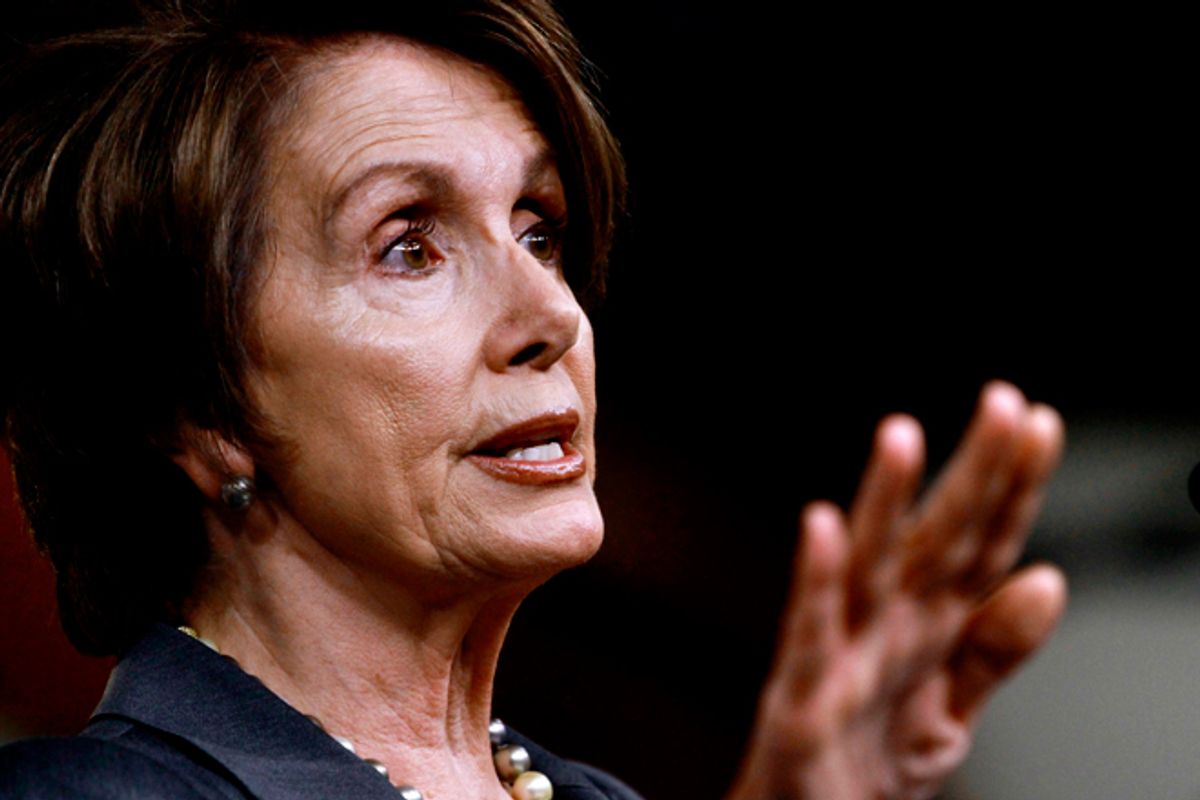This morning, House Democratic Leader Nancy Pelosi announced she’s staying on in her current role as minority leader after months of speculation that she would step down if Democrats didn’t win a majority in last week’s election. Indeed, her decision to run for the leadership spot in 2010 after Democrats lost the House was a highly unusual one, and predicated on the possibility of reclaiming the gavel in 2012. That obviously didn’t happen, and Pelosi may never be speaker again, but it’s probably a very good thing for progressives that she decided to stay on at a time when Democrats may face deep divisions over what do about the so-called fiscal cliff. (Technically, Pelosi has to win an election for the spot, but she's expected to win overwhelmingly.)
Indeed, progressive groups like MoveOn.org and the Progressive Change Campaign Committee had been organizing their members to lobby Pelosi to stay, but, as recently as yesterday afternoon, it was not at all clear she would. “I love you all very dearly, but I thought I'd tell my caucus first,” she told reporters yesterday morning, leading to Twitter jokes comparing her announcement to LeBron James’ much-hyped "the decision" TV special about which NBA team he would join. Ultimately, she decided to stay, saying there was much left to do. “We may not have the gavel, but as I can see in this room, we have the unity,” she said at a press conference this morning flanked by more than a dozen women Democrats.
And unity is key, perhaps more than ever in recent memory, for Democrats, and especially liberal Democrats, who are concerned that President Obama may forge a “grand bargain” that would cut entitlement programs like Social Security and Medicare. Only Pelosi, the most liberal speaker in history, can keep the House Democratic Caucus united and in a way that favors progressives.
Here’s why: With Pelosi gone, one of two things would happen. Most likely, Maryland Democratic Rep. Steny Hoyer would take over. He holds the No. 2 spot in the House Democratic leadership right now and has been waiting patiently for years to take the top job, which most political observers expected him to assume after the shellacking Democrats received in 2010.
But Hoyer, Pelosi’s one-time rival, is seen as unacceptable to the caucus’ increasingly powerful liberal base (the past three elections have nearly wiped out the centrist Blue Dogs, while liberals have made modest gains) and to outside progressive advocacy groups. Hoyer is the 138th most liberal member of the House, while Pelosi is the 79th, according to the National Journal’s vote ranking. And while Pelosi has been an unflinching advocate of progressive causes and a foe of the right -- it helps when your entire congressional district comprises the City of San Francisco and you win reelection with 85 percent of the vote -- Hoyer is viewed as a more conciliatory figure, even though his voting record is as liberal as many of his party's more liberal leaders.
The second possibility is worse. If Hoyer had run to replace Pelosi (the caucus has to elect the leadership), there was a chance liberal members, perhaps quietly backed by Pelosi, would have tried to run a candidate against him. That too would fracture the caucus, obviously.
Other congressional battles in recent years have usually been waged along clear party lines, where all Democrats, save perhaps a few of the most conservative members, line up together. Even on tough votes for Democrats, like Obamacare or cap and trade (which passed the House but never the Senate), there was a clear Democratic position and it was conservative Democrats, or those worried about electoral blowback, who went over to the Republican side.
On a grand bargain, that simple partisan math gets complicated by the fact that it’s a Democratic president who will be pushing any deal, good or bad, and Democrats are in the minority. Since a large chunk of House Republicans will never support a deal that includes tax increases, which any grand bargain almost certainly will, Speaker John Boehner will likely need at least some Democrats to vote with him. If Democrats can stay united, the thinking goes, they can hold out for a better deal. But if they're fractured, and enough are eager to make a quick deal, Boehner gains strength relative to Democratic Senate Majority Leader Harry Reid.
Beyond that, Pelosi has been an unusually effective fundraiser for Democrats, and prides herself on raising money from ideological rich liberals who are committed to the cause, as opposed to Wall Streeters or other donors who may be looking for something in exchange.



Shares